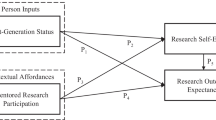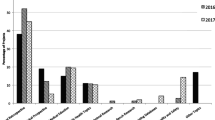Abstract
Faculty members in higher education are called to be effective researchers; however, there is limited research examining the research development of Ph.D. students. The cross-sectional, correlational investigation we report here examined levels of research self-efficacy, interest in research, and research knowledge of Ph.D. in education students (N = 67). Higher levels of research self-efficacy scores were predictive of higher interest in research and research knowledge. In addition, the students who engaged in research activities, including publishing manuscripts, scored higher in research self-efficacy than those not engaged in the publication process. Implications for doctoral student educators and higher education are discussed.
Similar content being viewed by others
References
American Educational Research Association (2011). Code of ethics. Washington, DC: Author.
Bandura, A. (1986). Social foundations of thought and action. Englewood Cliffs, NJ: Prentice-Hall.
Bard, C. C., Bieschke, K. J., Herbert, J. T., & Eberz, A. B. (2000). Predicting research interest among rehabilitation counseling students and faculty. Rehabilitation Counseling Bulletin, 44, 48–55.
Bieschke, K. J., Bishop, R. M., & Herbert, J. T. (1995). Research interest among rehabilitation doctoral students. Rehabilitation Education, 9, 51–66.
Bieschke, K. J., Bishop, R. M., & Garcia, V. L. (1996). The utility of the Research Self-Efficacy Scale. Journal of Career Assessment, 4, 59–75.
Bishop, R. M., & Bieschke, K. J. (1994). Interest in Research Questionnaire. Unpublished scale, The Pennsylvania State University, University Park, Pennsylvania.
Bishop, R. M., & Bieschke, K. J. (1998). Applying social cognitive theory to interest in research among counseling psychology graduate students: A path analysis. Journal of Counseling Psychology, 45, 182–188.
Boote, D. N., & Beile, P. (2005). Scholars before researchers: On the centrality of the dissertation literature review in research preparation. Educational Researcher, 34(6), 3–15.
Brown, T., Daly, B. P., & Leong, F. T. (2009). Mentoring in research: A developmental approach. Professional Psychology, Research, and Practice, 40, 306–313.
Calley, N. G., & Hawley, L. D. (2008). The professional identity of counselor educators. The Clinical Supervisor, 27(1), 3–16.
Carnegie Foundation (2003). Summary of doctoral education literature in education (Working Paper of the Carnegie Initiative on the Doctorate). Menlo Park, CA: Carnegie Foundation for the Advancement of Teaching.
Carper, R. M., & Williams, R. L. (2004). Article publications, journal outlets, and article themes for current faculty in APA-accredited school psychology programs: 1995-1999. School Psychology Quarterly, 19, 141–165.
Clark, R. A., Harden, S. L., & Johnson, W. B. (2000). Mentor relationships in clinical psychology doctoral training: Results of a national survey. Teaching of Psychology, 27, 262–268.
Cohen, J. (1988). Statistical power analysis for the behavioral sciences. Hillsdale, NJ: Erlbaum.
Cohen, J. (1992). Power primer. Psychological Bulletin, 112, 155–159.
Creswell, J. (2003). Research design: Qualitative, quantitative and mixed methods (2nd ed.). Thousand Oaks, CA: Sage.
DeVellis, R. F. (2012). Scale development: Theory and applications (3rd ed.). Newbury Park, CA: Sage.
Dohm, F., & Cummings, W. (2002). Research mentoring and women in clinical psychology. Psychology of Women Quarterly, 26, 163–167.
Forester, M., Kahn, J. H., & Hesson-McInnis, M. S. (2004). Factor structures of three measures of research self-efficacy. Journal of Career Assessment, 12, 3–16.
Fraenkel, J. R., Wallen, N. E., & Hyun, H. (2012). How to design and evaluate research in education (6th ed.). New York, NY: McGraw-Hill.
Gall, M. D., Gall, J. P., & Borg, W. R. (2007). Educational research: An introduction (8th ed.). Boston, MA: Allyn & Bacon.
Gay, L. R., & Airasian, P. W. (2009). Educational research: Competencies for analysis and application (9th ed.). Upper Saddle River, NJ: Merrill Prentice Hall.
Geisler, C. C. (1995). Scientist-practitioner interests, research self-efficacy, perceptions of the research training environment and their relationship to dissertation progress (Doctoral dissertation). Available from ProQuest Dissertations and Theses database. (Publication No. AAT 304208778).
Greeley, A. T., Johnson, E., Seem, S., Braver, M., Dias, L., Evans, K.,et al. (1989). Research Self-Efficacy Scale. Unpublished scale, The Pennsylvania State University, University Park, Pennsylvania.
Hollingsworth, M. A., & Fassinger, R. E. (2002). The role of faculty mentors in the research training of counseling psychology doctoral students. Journal of Counseling Psychology, 49, 324–330.
Houser, R. (2009). Counseling and educational research: Evaluation and application (2nd ed.). Thousand Oaks, CA: Sage.
Jenkins, D. E. C. (2010). The making of a researcher, researcher-in-the-making: An empirical examination of practices and processes involved with doctoral research training. (Doctoral dissertation). Available from ProQuest Dissertations and Theses database. (Publication No. AAT 3439435).
Jones, L. (2006). The role of faculty and peer research mentoring in research productivity, self-efficacy, and satisfaction of doctoral students (Doctoral dissertation). Available from ProQuest Dissertations and Theses database. (Publication No. AAT 305314898).
Kahn, J. H. (2001). Predicting the scholarly activity of counseling psychology students: A refinement and extension. Journal of Counseling Psychology, 48, 344–354.
Kahn, J. H., & Scott, N. A. (1997). Predictors of research productivity and science-related career goals among counseling psychology graduate students. The Counseling Psychologist, 25, 38–67.
Kline, T. J. B. (2005). Psychological testing: A practical approach to design and evaluation. Thousand Oaks, CA: Sage.
Lambie, G. W. (2012). Research knowledge asssessment. Unpublished scale, University of Central Florida, Orlando, FL.
Lambie, G. W., & Vaccaro, N. (2011). Doctoral counselor education students' levels of research self-efficacy, perceptions of the research training environment, and interest in research. Counselor Education and Supervision, 50, 243–258.
Lambie, G. W., Asher, D., Sivo, S. A., & Hayes, B. G. (in press). Counselor education doctoral program faculty members’ refereed article publications. Journal of Counseling & Development.
Lambie, G. W., Sias, S. M., Davis, K. M., Lawson, G., & Akos, P. (2008). A scholarly writing resource for counselor educators and their students. Journal of Counseling and Development, 86, 18–25.
Lent, R. W., Brown, S. D., & Hackett, G. (1994). Toward a unifying social cognitive theory of career and academic interest, choice, and performance. Journal of Vocational Behavior, 45, 79–121.
Love, K. M., Bahner, A. D., Jones, L. N., & Nilsson, J. E. (2007). An investigation of early research experience and research self-efficacy. Professional Psychology: Research and Practice, 38, 314–320.
McGrail, M., Rickard, C., & Jones, R. (2006). Publish or perish: a systematic review of interventions to increase academic publication rates. Higher Education Research and Development, 25(1), 19–35.
McMillan, J. H. (2012). Educational research: Fundamentals for the consumer (6th ed.). Boston, MA: Allyn & Bacon.
Mertler, C. A., & Charles, C. M. (2008). Introduction to educational research. Boston, MA: Pearson Education.
Mitchell, M. L., & Jolley, J. M. (2004). Research design explained (5th ed.). Belmont, CA: Wadsworth.
Murkami-Ramalho, E., Militello, M., & Piert, J. (2013). A view from within: How doctoral students in educational administration develop research knowledge and identity. Studies in Higher Education, 38, 256–271.
Okech, J., Astramovich, R. L., Johnson, M. M., Hoskins, W. J., & Rubel, D. J. (2006). Doctoral research training of counselor education faculty. Counselor Education and Supervision, 46, 131–145.
Overall, N. C., Deane, K. L., & Peterson, E. R. (2011). Promoting doctoral students' research self-efficacy: Combining academic guidance with autonomy support. Higher Education Research and Development, 30, 791–805.
Phillips, J. C., & Russell, R. K. (1994). Research self-efficacy, the research training environment, and research productivity among graduate students in counseling psychology. The Counseling Psychologist, 22, 628–641.
Platow, M. J. (2011). PhD experience and subsequent outcomes: A look at self-perceptions of acquired graduate attributes and supervisor support. Studies in Higher Education, 37(1), 103–118.
Rallis, S. F., & Rossman, G. B. (2012). The research journey: Introduction to inquiry. New York, NY: The Guilford Press.
Royalty, G. M., Gelso, C. J., Mallinckrodt, B., & Garrett, K. D. (1986). The environment and the student in counseling psychology: Does the research training environment influence graduate students’ attitudes toward research? The Counseling Psychologist, 14, 9–30.
Santo, S. A., Engstrom, M. E., Reetz, L., Schweinle, W. E., & Reed, K. (2009). Faculty productivity barriers and supports at a school of education. Innovative Higher Education, 34, 117–129.
Szymanski, D. M., Ozegovic, J. J., Phillips, J. C., & Briggs-Phillips, M. (2007). Fostering scholarly productivity through academic and internship research training environments. Training and Education in Professional Psychology, 1, 135–146.
Tabachnick, B. G., & Fidell, L. S. (2007). Using multivariate statistics (5th ed.). Needham Heights, MA: Allyn & Bacon.
Towne, L., Wise, L. L., & Winters, T. M. (2005). Advancing scientific research in education. NY: National Academies Press.
Troup-Leasure, K., Eichelberger, R., & Zigmond, N. (1992). Research experiences of doctoral students and publication after graduation. Teacher Education and Special Education, 15, 183–193.
Unrau, Y., & Beck, A. (2004). Increasing research self-efficacy among students in professional academic programs. Innovative Higher Education, 28, 187–194.
Youn, T. I. K., & Price, T. M. (2009). Learning from the experience of others: The evolution of faculty tenure and promotion rules in comprehensive institutions. Journal of Higher Education, 80, 204–237.
Author information
Authors and Affiliations
Corresponding author
Rights and permissions
About this article
Cite this article
Lambie, G.W., Hayes, B.G., Griffith, C. et al. An Exploratory Investigation of the Research Self-Efficacy, Interest in Research, and Research Knowledge of Ph.D. in Education Students. Innov High Educ 39, 139–153 (2014). https://doi.org/10.1007/s10755-013-9264-1
Published:
Issue Date:
DOI: https://doi.org/10.1007/s10755-013-9264-1




